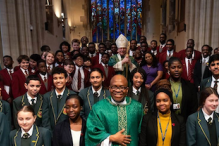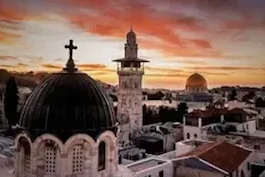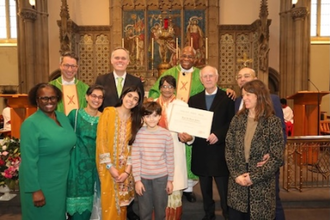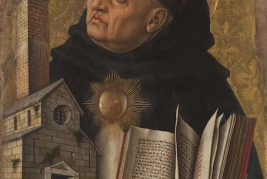Westminster: Journey of a parish racial justice group
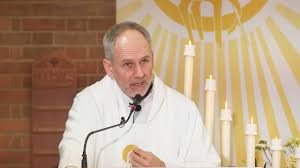
Fr Richard Nesbitt
Fr Richard Nesbitt is parish priest of Our Lady of Fatima, White City. He gave the following presentation at the online Westminster Social Justice and Peace Forum on 5 December with the theme, 'Learning from the Pandemic'.
I have been asked to share with you today something of the journey we have travelled as a parish community regarding racism since the killing of George Floyd on 25 May and the resulting resurgence of the Black Lives Matter movement. This has meant facing up not only to the reality of racism in the wider society, but also crucially in our own parish community. "We" here means the parish of Our Lady of Fatima in White City, which, despite its name (!), is a vibrantly multicultural community in one of London's largest social housing estates.
To be honest, it wasn't the George Floyd killing which was the decisive spark for this journey. I remember being shocked by the George Floyd footage, but at the same time thinking, "that's something that happens in the US - it's an 'over there' kind of story." I think for me personally it was the pulling down of the statue of Edward Colston in Bristol on 7 June which really woke me up. As a teenager I lived in Bath and I used to go across to Bristol for rock and pop concerts with bands like Siouxsie and the Banshees and the Thompson Twins which all took place at the Colston Hall. I had never even once asked myself why 'Colston Hall'? or who is this "Colston" guy? So to discover back in June that he was a 17th century slave trader, based in Bristol, who made his vast fortune through human suffering came as a huge shock and kind of wake-up call to me personally. I realised that there was a whole narrative of our British history that I had never really engaged with.
As the parish priest here I struggled initially to know how to talk about this but I was greatly helped by the series of videos 'Being Black and Catholic' which were posted on the Westminster Diocese website in July. Watching them really helped me to understand that this was not an "out there" problem, but that it was very much inside the Church as well. I preached about the darnel of racism, including in our parish community, on Sunday 19 July and pointed people towards the videos. After that homily a lot of parishioners, especially black parishioners, came to talk about how relieved they were that this was finally being talked about and addressed, not just in the parish but also by the diocese and the wider Church.
Some suggested that it was an important opportunity for parishioners to be able to share their thoughts and experiences - they had waited so long! - so we arranged a Zoom meeting for the following Sunday evening. Over 20 parishioners, mainly black women, came together on that evening and the journey began in earnest. For me personally, as a middle-aged, middle-class white man, that evening and all the conversations which have followed have been an incredibly powerful eye-opener. I have just been so blind to this whole issue and the daily impact it has on so many people's lives, including so many of our very multicultural parish.
Our Sunday evening Zoom calls have become a regular event and the depth of trust and sharing, often of very painful and raw experiences, has been very profound and moving. A real picture has emerged of significant and indeed fundamental changes which are needed in various areas of our parish life so that different forms of racism can be uprooted. These include:
Leadership roles within the parish - do they reflect the racial profile of the parish and how are these leadership roles chosen. Greater transparency in the process of choosing/appointing leaders.
Making sure that different racial groups are equally represented in parish ministries (Readers, Eucharistic Ministers etc...) and that at major celebrations in the year (Christmas, Easter...) there is a mix of different racial groups taking part in these ministries (eg. reading at the Easter Vigil)
The artwork in the church - how can we bring in a greater diversity of religious imagery so that it is not a sea of white-skinned depictions of Jesus, Mary and the saints
Charity work - we had a powerful conversation about the danger of a "White Saviour" syndrome by which it is predominantly white parishioners making appeals on behalf of poor black children.
The Repository - how to make sure that there is a wide variety of skin colours and racial imagery in the cards, books etc... stocked in the repository
Music - how do we make sure that we have a diversity of musical styles which reflect our multicultural community?
Sign of Peace - how do we challenge clearly racist behaviour and attitudes manifested in our daily parish life eg. at the Sign of Peace where some black parishioners still today regularly experience rejection by white parishioners who turn away or refuse to shake hands. This was something which I found particularly shocking.
Finally, we agreed that perhaps the most powerful way to help the wider parish community learn from our conversations was through personal stories. Our initial idea was to make a series of "talking heads" videos with parishioners, I guess in the style of the "Being Black and Catholic" videos. One of the group has film-making skills and equipment, so we set up a mini studio in the parish centre one Sunday afternoon and waited, and waited. No-one showed up! At the Zoom call that evening one person after another explained that they had had second thoughts and real concerns about the potential social media backlash of "putting something out there." So instead we agreed that people would be comfortable writing down their personal reflections/ experiences for others to read, and keeping their accounts anonymous. Twelve of the group have so far done this and they are incredibly powerful reflections. Here are fragments from two of them:
"I think every black person living in the UK sooner or later in their lives will have 'the conversation' in which their parents/family will explain to them that simply because of the colour of their skin, some things will be more difficult for them in life, and that they will experience racism in different forms. My family originally come from Jamaica and I remember as a young girl having a conversation with my grandmother in the kitchen while we were preparing supper together…
That takes me forward to when we had our own child, just a few years ago. We had not been sure that we would be able to have children and even when I became pregnant I was really unsure all the way if this was going to end well. So, I remember how we pushed the baby shower party with my friends as late as we could - only seven days before our son was born and even then I told my friends to keep the receipts for their presents just in case. And then I remember how out of the blue at the party I was just suddenly overcome with a deep sadness because I realised that there would be people who would make judgements about our son, even despise him just because of his race. I thought to myself - when will people stop thinking of him as cute and start seeing him as a threat? when will that line come in his life? They would never know how much we had prayed and prayed for him to be born, that he is our blessing. He is still only six but he has already had at least one experience of another child saying something very hurtful towards him because of his colour. We do everything we can to protect him from all of this, but we know that the time will come, sooner or later, when it will be our turn to have 'the conversation' with him. We will need to prepare him for experiences of racism."
"I think there's a good mix of parishioners helping out in the church. However, I do question whether we have enough visibility of black leaders within the parish. Sad to say the roles I've often seen black parishioners fill have been in positions of servitude. I know we're all here to serve - but time and time again black members of the parish seem to be the ones who do the cleaning and tea giving - roles that are generally looked down upon or which have in society, historically, been held by those in less affluent circumstances. It feels as if we as a parish are holding outdated stereotypical and racist perspectives that don't serve us and do more harm than good. It's heartbreaking to know of all the talent that exists within the parish and not see this tapped into…
I'd also make this point, that when it comes to the parishioners who speak out about the charitable causes within the parish such as Mary's Meals or CAFOD fast day. We have a number of white parishioners who speak up on behalf of the 'poor black people' who are so often depicted as such in the films shared. As an observer it feels like a white saviour complex played out on the sanctuary, painting a misleading and unbalanced picture of reality. The underlying message has felt like without white support leading the way, making a difference would not be possible."
Our aim is to make all these reflections accessible to the wider parish community for Racial Justice Sunday at the end of February and then to really challenge people to reflect upon their own attitudes and behaviour, conscious and unconscious. We have also begun a video project with some of our teenage parishioners, led by a young local black female artist, who is going to use the idea of "lament" in abstract art and music to help the teenagers and their parents/grandparents explore their own attitudes towards racism. We are also very encouraged that our parish Catholic primary school, St John XXIII, has also embarked on a similar journey amongst its parents, governors and staff (and later children).
That, in a nutshell, is the journey travelled so far. It has been very raw and painful for many but in the bigger picture incredibly healing and hopefully when it comes to the wider parish community where we will see the real fundamental change which needs to happen. Of course, this is something so deep that it won't happen overnight, but I give thanks to God and the wonderful parishioners who have been so passionately engaged in this so far that we are making this journey. We look forward to seeing where God takes it!
Finally, I have been really helped by reading the book 'Racial Justice and the Catholic Church' by Fr Bryan Massingale. He is talking about the Church in the US but I think it applies very much to us here in the UK as well. Here is a section from the book:
"American Catholic Social Teaching on race suffers from a lack of passion. As a corporate body and as individuals, Catholics espouse a number of beliefs, but not all of these are held passionately. For example, no one can doubt the passion with which the Catholic Church opposes abortion. If others know anything about Catholicism, they certainly know that the Catholic Church is against abortion. This position is articulated repeatedly, forcefully and uncompromisingly. It is a position held fervently and passionately, even in the face of significant opposition and disagreement. Opposition to abortion is a major public marker of Catholic identity.
However, racial justice is not now - and never has been - a passionate matter for most American Catholics. Teaching on racism has had little impact upon the consciousness and behavior of the vast majority of American Catholics, as it is a matter of low institutional commitment, involvement and importance. If 'passion' connotes commitment, involvement and fervour, the Catholic stance on racism, in contrast, can be characterised as tepid, lukewarm and half-hearted. Standing against racism is not a core component of Catholic corporate identity."
There has been a complacency, a blindness towards racial justice in our Catholic tradition and culture. The time has come for the Church, at all levels - the Magisterium, parish life, seminary training, diocesan structures, etc… to radically engage with our need to make Racial Justice as key to Catholic identity as issues such as abortion and other pro-life issues. As Pope Francis said following the death of George Floyd: "we cannot tolerate or turn a blind eye to racism and exclusion in any form and yet claim to defend the sacredness of every human life."





